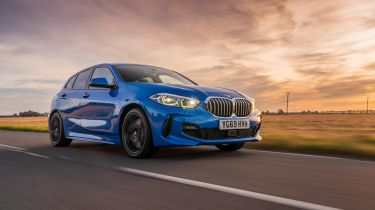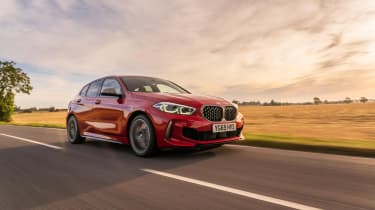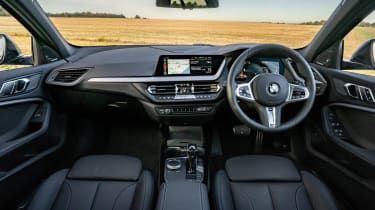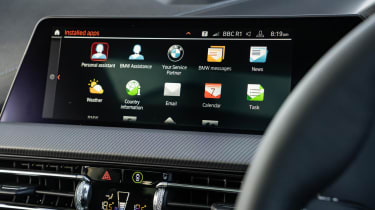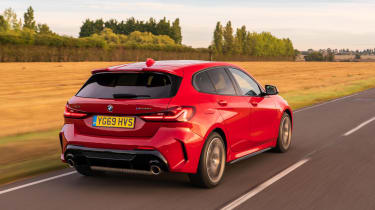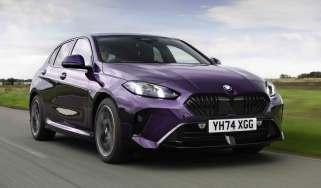All-new BMW 1 Series prices revealed
The new BMW 1 Series switches to front-wheel drive for the first time and is priced from £24,430
BMW has revealed that the all-new BMW 1 Series has a starting price of £24,430. The big-selling model is front-wheel-drive for the first time, which increases interior space and reduces the car’s weight. BMW is yet to reveal pricing information or an on-sale date but the company’s social media networks confirmed that it’ll be in showrooms before the end of 2019.
The change to front-wheel drive is the most significant one in the 1 Series’ history. While enthusiasts argue that it robs the individuality and unique driving characteristics, BMW is keen to point out the benefits of sending the power to the front wheels. It also brings it closer to its rivals, which include the Mercedes A-Class, Volkswagen Golf and Audi A3.
2019 BMW 1 Series styling
The latest model is all-new, and that starts with the styling. It’s markedly different to the outgoing BMW 1 Series with more aggressive detailing that brings it closer to the BMW X2 SUV. The low, sloping front end features much larger ‘kidney’ grilles, steeply angled headlights and a wide lower air intake. The range-topping M135i performance model adds a sportier bumper, silver mirror caps and bi-colour 19-inch alloy wheels - the largest size ever for BMW’s smallest car.
The windowline, painted black on the M135i, rises over the rear wheels and joins the top of the windows with a so-called ‘Hofmeister kink’, a BMW styling characteristic. At the back of the car, every part has been redesigned, including the optional LED tail-lights, rear bumper and spoiler. As the sportiest version, this M135i features black plastic detailing, two exhaust pipes and a larger spoiler than the standard car. On the whole, the car looks less subtle than the outgoing model.
Interior
Despite the distance between the front and rear wheels (known as the wheelbase) actually being slightly shorter than the last car, there’s more space inside for passengers. Rear-seat occupants will certainly notice the extra room; the current 1 Series is far less spacious than rivals but knee, elbow and headroom have all been improved. The boot space is bigger too and, with 380 litres to fill, it exactly matches the Volkswagen Golf and beats the Ford Focus.
The interior offers plenty of high-quality materials, backlit trim strips and a driver-focused layout. Entry-level cars get traditional dials either side of a 5.1-inch display, while cars with the BMW Live Cockpit Professional package enjoy a 10.25-inch digital instrument cluster and a same-sized central touchscreen. The latter can be fitted with gesture control as an option, although the interior should be very easy to use anyway. A range of upholstery trims are available, depending on the specification, while sports seats and black perforated leather seats can be selected at extra cost.
Specifications and prices
The entry-level model of the 2019 BMW 1 Series is the 118i in SE trim, which uses a 1.5-litre three-cylinder petrol engine and costs £24,430. A six-speed manual comes as standard but a seven-speed automatic is available as an option. The SE is front-wheel drive only. The diesel 116d and 118d start from £25,500 and £26,640 respectively. The 118d is available with a sportier eight-speed Steptronic Sport gearbox as an option but it’s standard on the range-topping, four-wheel drive 120d and M135i models.
Moving up to Sport trim increases the price of the 118i to £25,430, and the 116d Sport and 118d Sport to £26,500 and £27,640 respectively.
The 118i in M Sport trim costs £27,230 and the 116d M Sport is £28,300. The 187bhp 120d xDrive Sport is the most powerful diesel model and starts at £32,470.
The fastest 1 Series is the M135i xDrive. It costs £36,430 and comes as standard with the eight-speed Steptronic gearbox and four-wheel drive.
Technology
As a premium hatchback, there’s a suitably extensive technology list. On cars with sat nav and adaptive cruise control, the car can ‘avoid unnecessary gear changes’ and decide when to shut the engine down. Either version of the 1 Series’ cruise control can come to a stop and restart without the driver’s input, and can set the limit according to speed sign recognition software.
A head-up display (that shows your speed and navigation information on the windscreen), parking sensors and automatic parking are optional extras. Delve further into the options list and you’ll find wireless phone charging, the ability to use your phone as a key, a Harman Kardon stereo, connected navigation and BMW’s ‘Intelligent Personal Assistant’.
Essentially an advanced voice control function, the virtual assistant understands more commands than a standard system. It can adjust the temperature if you ask, find free parking spaces at your destination and can tell you about the car’s status and how to use each function.
There’s a full roster of safety technology available too. Collision/pedestrian warnings and auto emergency braking are standard, as is lane-departure warning with active lane return. A Driving Assistant with lane-keeping assistance, rear collision warning and cross-traffic monitoring, is available for additional outlay.
Engines and driving
Although the move from rear to front-wheel drive has upset purists, BMW says that 85% of customers won’t be able to tell the difference. It also opens up the possibility of a hybrid model, which is expected after the car goes on sale. If a plug-in hybrid 1 Series is introduced, it’ll probably use the combination of 1.5-litre petrol engine and electric motor found in the MINI Countryman PHEV.
The entry-level 1.5-litre three-cylinder petrol engine is likely to be one of the bestsellers. Badged 118i, it produces 138bhp and gets from 0-62mph in 8.5 seconds, despite managing a claimed 47.1mpg in mixed driving.
At the top end of the range, the M135i uses a 2.0-litre four-cylinder petrol engine in place of the old car’s 3.0-litre six-cylinder engine but its 302bhp means 0-62mph is completed in 4.8 seconds and it’ll reach a limited top speed of 155mph. BMW claims up to 35.3mpg for this engine and, when it goes on sale, the M135i xDrive will rival fast hatchbacks like the Mercedes-AMG A 35 and the Volkswagen Golf R.
Three diesel engines are available from the outset, so you’ll have a choice of 116d, 118d or 120d models. The 114bhp 116d model uses a 1.5-litre three-cylinder engine and returns up to 61.4mpg and does 0-62mph in 10.1 seconds.
Both the other diesels have a 2.0-litre four-cylinder engine, capable of 60.1mpg in the 118d and 51.4mpg in the 120d xDrive. These versions are tuned to offer 148 or 187bhp respectively, with the more powerful engine getting from 0-62mph in seven seconds.
BMW claims the new FAAR platform gives the new 1 Series improved handling and ride quality. The car has a wider track, increased rigidity, a revised steering setup, new rear suspension and a reworked stability control system. Options for the 1 Series will include sports suspension, with the M135i getting a torque-vectoring limited slip differential as standard to improve grip in corners.
How does the new BMW 1 Series compare to its main rival, the Mercedes A-Class? Read our in-depth review.
Recommended
Most Popular
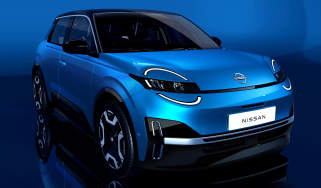
New Nissan Micra is a Renault 5 in Nissan clothing
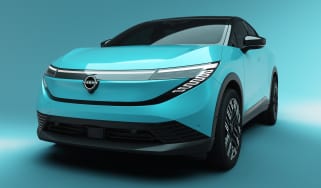
New Nissan Leaf is here! Groundbreaking EV has morphed into an SUV
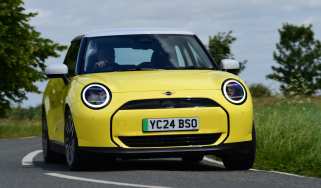
Best car leasing deals 2025: this week’s top PCH offers
Tips & advice

Car dashboard warning lights: what does each symbol mean?

Electric car charging stations: public networks, charger types, apps and maps


